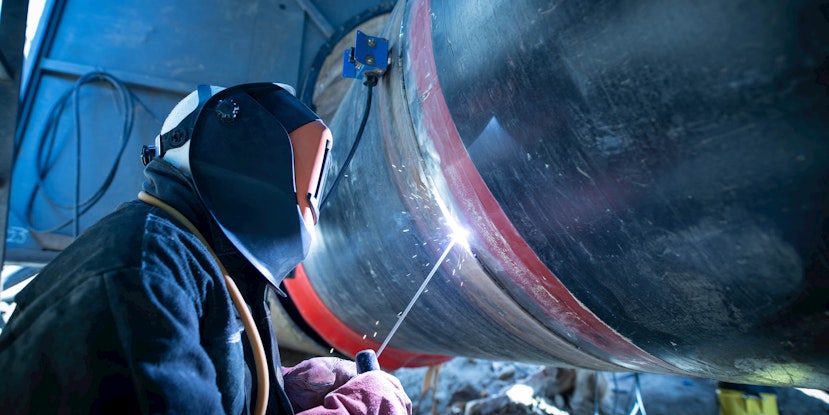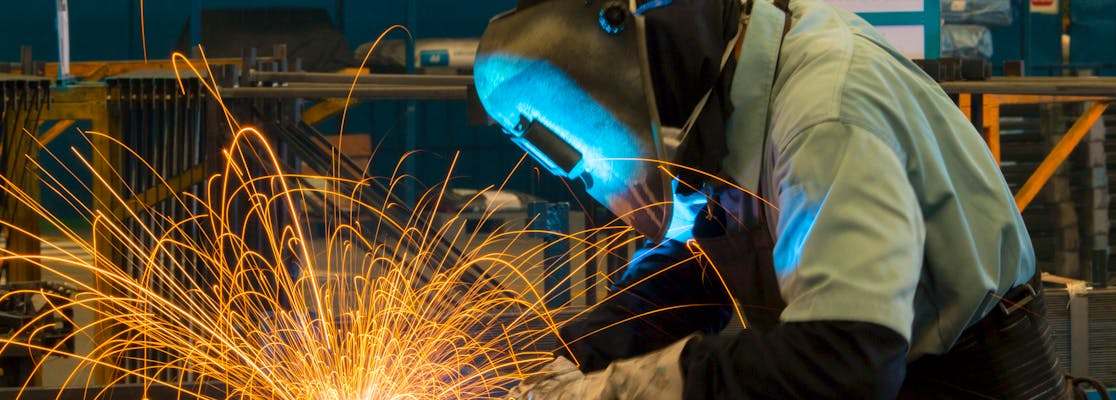Is Metal Fabrications a Good Career Path? – A Complete Guide
Updated November 20, 2023
- What Is Metal Fabrication?
- What Does a Fabricator Do?
- Is Metal Fabrications a Good Career Choice?
empty
empty
- Which Roles Are Available in Metal Fabrication?
empty
empty
empty
empty
empty
empty
empty
- Necessary Skills and Qualifications for a Metal Fabricator
empty
empty
- How Much Can you Earn As a Metal Fabricator?
- Frequently Asked Questions
- Final Thoughts
Metal fabrication is a great career choice if you’re technically minded and enjoy hands-on work. It’s an occupation with job stability, versatility, and high earning potential, but is it the right fit for your specific skills and interests?
Metal fabrication is a technical profession with many areas of focus and plenty of scope for progression.
You may need a little help to decide if it’s the right career path for you. This article explains what fabrication work is, what roles are available in the field, and the skills and qualifications you’ll need to get started.
What Is Metal Fabrication?
Metal fabrication is a manufacturing technique that involves shaping, cutting and assembling metal materials to create various structures, components, and products.
It plays a crucial role in the production of everything from simple brackets and structural beams to complex machinery and industrial equipment, and is used in a wide range of industries including:
- Construction
- Manufacturing
- Energy and power
- Automotive
- Oil and gas
- Transportation
- Aerospace
- Electronics and technology
- Consumer goods
Metal fabrication can be performed with various types of metals, including steel, aluminum, stainless steel, copper, and more, depending on the application's requirements.
The precise methods and techniques used in metal fabrication depend on factors such as the type of metal, the project's complexity, and the desired end product.
What Does a Fabricator Do?
A metal fabricator is a skilled professional responsible for a variety of tasks. These can vary depending on the specific industry or project they’re involved in, but may include:
-
Reading and interpreting blueprints – Fabricators start by studying detailed blueprints, engineering drawings, or design specifications to understand the requirements of the project.
-
Material selection – They select the appropriate type of metal material for the project, considering factors such as strength, durability, and cost-effectiveness.
-
Cutting and shaping – A metal fabricator uses various cutting methods (for example, laser cutting, plasma cutting, shearing) to shape metal sheets or bars according to the design specifications.
-
Bending and forming – Metal fabricators use specialized machinery, like press brakes, to bend and shape metal components, ensuring they meet the required dimensions and angles.
-
Welding – Welding is a critical skill in fabrication work. Fabricators join pieces of metal together by melting and fusing them using welding techniques such as metal inert gas (MIG), tungsten inert gas (TIG), or arc welding.
-
Machining – Some projects may require machining operations like drilling, milling, or turning to achieve precise measurements or create threaded holes.
-
Assembly – Fabricators assemble components and parts to create larger structures or products. This involves aligning, fastening, and welding pieces together to ensure they fit seamlessly.
-
Finishing and surface treatment – Depending on the project, a metal fabricator may apply finishing touches, such as grinding, polishing or applying protective coatings to enhance the appearance and durability of the end product.
-
Quality control – A metal fabricator may also be responsible for inspecting work at various stages to ensure it meets quality standards and specifications. This includes checking for defects, proper measurements, and overall structural integrity.
Is Metal Fabrications a Good Career Choice?
Whether metal fabrication is a good career path for you depends on your interests, skills, and career goals.
To help you make an informed decision, let's explore some of the pros and cons of the profession.
Pros
- Job stability
- Versatility
- Hands-on work
- Technical skill development
- Earning potential
Cons
- Physical demands
- Safety risks
- Strenuous work environment
- Technical learning curve
Is Metal Fabrications a Good Career Path? – Pros
Job Stability
Metal fabrication is a fundamental part of many industries, including construction, manufacturing, aerospace, and automotive.
As long as these industries exist, there will be a demand for skilled metal fabricators.
Versatility
Fabrication jobs offer a wide range of career opportunities. You can work on anything from structural steel for buildings to intricate art pieces, giving you the chance to explore various sectors and projects.
Hands-On Work
If you enjoy working with your hands and seeing tangible results, metal fabrication can provide a fulfilling experience with a high level of job satisfaction.
Technical Skill Development
Metal fabrication requires a combination of technical skills, including welding, machining, and blueprint reading.
As you gain experience, you can become highly skilled in these areas, increasing your value in the job market.
Earning Potential
Skilled metal fabricators can earn competitive salaries, and the potential for higher earnings increases with experience and expertise.
Is Metal Fabrications a Good Career Path? – Cons
Physical Demands
Metal fabrication can be physically demanding, involving heavy lifting, standing for extended periods, and exposure to potentially hazardous materials.
Safety Risks
Working with metal and machinery carries inherent safety risks. Metal fabricators must adhere to strict safety protocols and wear protective equipment to minimize the risk of accidents.
Strenuous Work Environment
Fabrication shops can be noisy, hot, or cold, depending on the location and type of work. Adverse working conditions can be challenging for some individuals.
Technical Learning Curve
Becoming proficient in metal fabrication requires time and dedication to learning various techniques and skills, which can be challenging for beginners.
Ultimately, metal fabrications is a good career choice if you’re looking for hands-on technical work with advancement potential, and are prepared for the physical demands and safety risks that come with the job.
Which Roles Are Available in Metal Fabrication?
As a diverse profession spanning multiple industries, there are various paths you can take as a metal fabricator.
Here’s a closer look at some of the most popular routes.
Welder
Welders are skilled professionals responsible for joining metals through various welding processes.
They read and interpret blueprints, select the appropriate welding method and materials, and use welding equipment to create strong and structurally sound connections.
Welders play a critical role in manufacturing, construction and repair industries, ensuring that metal components are securely bonded together.
Sheet Metal Worker
Sheet metal workers specialize in the fabrication and installation of metal components made from thin sheets of metal. They cut, shape, bend and assemble these sheets to create various products, including HVAC ducts, roofing, and architectural elements.
Sheet metal workers use a variety of tools and machinery, including shears and brakes, to work with materials like steel, aluminum, and copper, ensuring precise measurements and high-quality finished products.
Millwright
Millwrights are highly skilled tradespeople who install, maintain and repair industrial machinery and equipment in various settings, including factories, power plants, and construction sites.
They’re responsible for aligning and assembling heavy machinery, performing precision adjustments, and troubleshooting mechanical issues.

Boilermaker
Boilermakers construct and repair boilers, pressure vessels, and other large containers designed to hold liquids or gasses at high pressure and temperature.
They work with various materials, including steel, to fabricate and install these critical components in industries such as power generation, petrochemical, and manufacturing.
Pipe Fitter
Pipe fitters are experts in assembling, installing and maintaining piping systems that transport liquids, gasses, and steam in industrial facilities, commercial buildings, and residential structures.
They read blueprints, cut and thread pipes, and use various tools to ensure accurate measurements and tight seals. Pipe fitters play a vital role in ensuring the proper functioning of plumbing and HVAC systems, as well as large-scale industrial piping networks.
Tool and Die Maker
Tool and die makers create and maintain specialized tools, molds and dies used in manufacturing processes to produce precision parts and components.
They work with materials like steel and tungsten carbide to craft these custom tools, ensuring they meet strict tolerances and specifications.
Tool and die makers are essential in industries like automotive and aerospace, where precision and consistency are crucial.
CNC Machinist
Computer numerical control (CNC) machinists operate and program computer-controlled machines to precisely cut, shape, and finish metal and plastic parts.
They read technical drawings, set up CNC machines, input code, and monitor the machining process for quality and accuracy.
In addition to these roles, there are several advanced and specialist positions in the field of metal fabrications, such as robotics engineers, quality control inspectors, automation technicians and metallurgists.
These fabrication jobs focus on cutting-edge technologies, process optimization, and materials science to further advance the industry and meet evolving demands for precision and efficiency in manufacturing and fabrication.
Necessary Skills and Qualifications for a Metal Fabricator
To start your journey as a metal fabricator, you'll typically need a high school diploma or GED, ideally with a strong foundation in math, science, and technical courses.
A college degree is not always required, but can be beneficial for certain roles, especially if you want to advance to supervisory, engineering, or design positions.
A common path to entry is through an apprenticeship program. These programs are usually offered by trade unions, trade schools, or employers and provide a combination of on-the-job training and classroom instruction.
Whatever entry route you take, you’ll need a combination of technical and soft skills to succeed.
Technical Skills for a Metal Fabricator
Metalworking techniques
Understanding various metalworking techniques, such as welding, cutting, bending, and shaping, is essential.
Proficiency in these techniques allows you to work with different types of metals effectively.
Mathematics
Math is a fundamental skill for metal fabricators.
You'll need to perform calculations for measurements, angles, dimensions, and material quantities. Accurate math skills ensure precision in your work, reducing errors and material wastage.
Mechanical Aptitude
Mechanical aptitude is your innate understanding of machinery, tools, and mechanical systems.
It ensures that you can troubleshoot, operate, and maintain the machinery crucial to the fabrication process.
Blueprint Reading
The ability to read and interpret engineering drawings and blueprints is also crucial. You must understand the specifications, tolerances, and dimensions outlined in the plans to create accurate metal components.
Machine Operation
You should be familiar with various metalworking machines, such as lathes, mills, shears, and presses. You should know how to set up and operate these machines safely and efficiently.
Welding and Soldering
Proficiency in welding and soldering techniques is a core skill for metal fabricators. Different welding methods, such as MIG, TIG and arc welding, may be required, depending on the project.
Metallurgy
A basic understanding of metallurgy helps you choose the right metals for specific applications.
Knowing how different metals behave under various conditions and temperatures is crucial for producing durable products.
Soft Skills for a Metal Fabricator
Attention to Detail
Precision and accuracy are key in metal fabrication, and a keen eye for detail ensures that your work meets specifications and safety standards.
Problem-Solving
Metal fabricators often encounter unexpected challenges, so the ability to think critically and find creative solutions to problems is vital for overcoming obstacles in the fabrication process.
Communication
Effective communication is essential for collaborating with team members, supervisors, and clients. You must be able to convey your ideas, ask questions, and provide updates clearly and professionally.
Time Management
Metal fabrication projects often have tight deadlines. Good time management skills help you complete tasks efficiently and meet project schedules.
Adaptability
The ability to adapt to new technologies and techniques is crucial in a field that’s continually evolving. Being open to learning and staying updated with industry trends are important.
Teamwork
Metal fabrication often involves working in a team environment, and you’ll need to collaborate with coworkers, engineers, and designers to ensure project success.
How Much Can you Earn As a Metal Fabricator?
As it’s such a varied profession, there is a wide pay scale for careers in metal fabrication.
To give you a basic overview, at the time of writing, the average salary for a metal fabricator in the US is $49,388, with entry level positions paying in the region of $35,000.
If you have a willingness to learn and are eager to progress, you can reasonably expect to earn upwards of $60,000.
Metal fabricators at the top of their profession in specialist areas can even command six figure salaries.
Some of the best paying jobs in metal fabrications include:
- Welding engineer
- Welding inspector
- Boilermaker
- Ironworker
- Metal analyst
- Metallurgical engineer
- Structural steel fabricator
Frequently Asked Questions
A metal fabricator transforms raw metal materials into finished products or components through various processes such as cutting, welding, bending, and assembling.
These professionals work with a wide range of metals to create structures, machinery parts, or custom metal products. They play a crucial role in various industries, including construction, manufacturing, automotive, energy, and consumer goods.
The responsibilities of a metal fabricator include interpreting blueprints, using machinery and tools, and ensuring the quality and precision of the final metalwork.
Metal fabrications is a good career path if you enjoy working with your hands, have strong attention to detail, and a high level of mechanical aptitude.
It offers job stability and opportunities for career growth, as there’s consistent demand for metal fabricated products across various industries.
Talented metal fabricators often earn competitive salaries, and you can work towards more specialized roles as you develop your skills and experience.
In the field of metal fabrication, certain positions tend to offer higher salaries due to specialized skills, experience, and responsibilities.
Some of these include welding engineers and welding inspectors, skilled machinists, and structural steel fabricators who work on large scale construction projects such as bridges and skyscrapers.
You can also expect to earn a higher salary if you work your way up to a supervisory or management position within a metal fabrications setting.
The U.S. Bureau of Labor Statistics reported an estimated 58,870 individuals were employed in metal fabrications in 2022, with little to no change forecast for those figures in the near future.
State-wise, how many jobs are available in metal fabrications? Well, states with the highest metal fabrication employment figures include California, Texas, Michigan, Wisconsin, and Illinois.
To secure a job in metal fabrication, you'll need a proven set of technical skills such as welding, cutting, and shaping metals, the ability to read blueprints and schematics, and knowledge of various fabrication tools and equipment.
You’ll also need demonstrable soft skills such as attention to detail, problem-solving skills, teamwork, and communication.
To gain hands-on experience, consider pursuing an apprenticeship or enrolling on a vocational training program.
The job outlook for the metal fabrication field is generally stable, with employment opportunities available across many areas and industries.
While many processes are now automated, there is still a strong demand for skilled metal fabricators who can oversee and operate advanced machinery, ensure quality control, and work on complex and custom projects.
Metal fabricators with expertise in specialized areas, such as welding, CNC machining, or sheet metal fabrication, are particularly sought after by employers.
In the US, the average pay for a metal fabricator is currently around $49,000 per year. However, there are a number of factors that contribute to the salary you can expect to be offered.
These factors include your education level and years of experience, and any specialized skills or certifications you may have.They also include the job location and the size and reputation of the company you work for
Additional factors like overtime, bonuses, and benefits can also influence the overall compensation package for metal fabricators.
Final Thoughts
With so many industries relying on metal products and structures, skilled metal fabricators are likely to remain in high demand for many years to come.
The role is diverse, with plenty of scope to follow a specific interest, from crafting custom designs to working on large-scale industrial projects.
If you have a high level of mechanical aptitude and enjoy getting hands-on in your work, a career as a metal fabricator could be a good option for you, with a stable job outlook, opportunities for growth, and relatively high earning potential.





